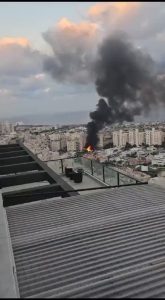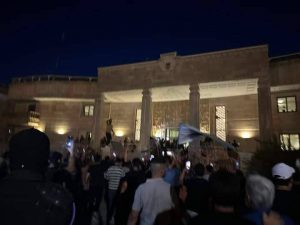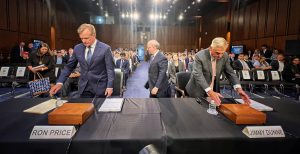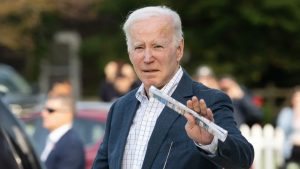Saudi Arabia and Iraq on Wednesday reopened their Arar desert crossing, indicating a long-awaited sign of closer trade ties between the two Arab nations, AFP reported. Saudi Arabia had cut off its ties with neighbouring Iran in 1990 following the then-Iraqi dictator Saddam Hussein’s invasion of Kuwait.
Top officials, including Iraq’s interior minister and the head of its border commission, travelled from Baghdad to formally open Arar, where a line of cargo trucks stood waiting.
The Saudi ambassador to Iraq was also in attendance and a delegation from Riyadh was to open the Saudi side of the border.
The border crossing will now be open for both goods and people. For the past 30 years, it was only opened on rare occasions to allow Iraqi religious pilgrims through on their way to Mecca for the Hajj.
Pro-Iran factions issue threat
The pro-Iran factions in Iraq that call themselves the ‘Islamic Resistance’ have stood firmly against closer ties with Saudi Arabia.
Ahead of Arar’s reopening, one such group identifying itself as Ashab al-Kahf published a statement announcing its “rejection of the Saudi project in Iraq”, AFP reported.
“The intelligence cadres of the Islamic Resistance are following all the details of the Saudi enemy’s activities on the Iraqi border,” it had warned.
Also read: US Embassy in Iraq targeted by rockets: Security sources
Iraqi Prime Minister Mustafa al-Kadhemi, who has forged close ties with Saudi Arabian crown prince Mohammad bin Salman, fired back on Tuesday against those describing the rapprochement as Saudi “colonialism”.
“This is a lie. It’s shameful,” he said.
“Let them invest. Welcome to Iraq,” Kadhemi added, saying Saudi investment could bring in a flood of new jobs to Iraq where more than one-third of youth are unemployed.
Iraq-Saudi Arabia relations since 2003
Dictator Saddam Hussein’s regime was toppled in a US-led invasion in 2003. Even after that, Riyadh looked at the new Shiite-dominated political class with suspicion due to their ties to Iran.
It only reopened its embassy in Baghdad in 2015.
Also read: Several wounded in WWI memorial attack at Jeddah cemetery for non-Muslims
In 2017, the then Saudi foreign minister Adel al-Jubeir travelled to Baghdad — the first such visit in decades — followed by a Riyadh trip by Iraqi premier Haider al-Abadi.
The first commercial flights resumed between the two countries and officials began discussing Arar, with high-profile US diplomat Brett McGurk even visiting the crossing in 2017 to support its reopening.
Current Iraqi Prime Minister Mustafa al-Kadhemi has forged close ties with Saudi Crown Prince Mohammed bin Salman.
Kadhemi was to travel to Saudi Arabia as his first foreign trip as prime minister in May, but the visit was cancelled at the last minute when Saudi King Salman was hospitalised.
He has yet to make the trip, although Iraqi ministers have visited Riyadh to meet with their counterparts and a top-level Saudi delegation travelled to Baghdad last week.






